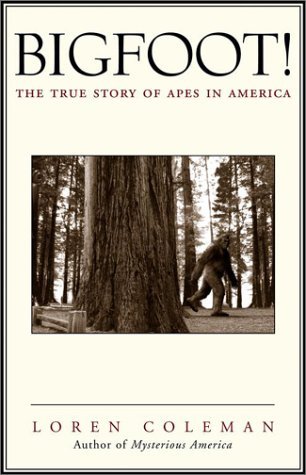
October 3, 2008
Judy Simpson led a brief demonstration outside of Longbranch Coffeehouse before a banned book reading Thursday afternoon, October 2, 2008. The event marked the 27th annual Banned Book Week and saw university professors and librarians among others read to a packed house. Credit: Brandon Chapple
The Daily Egyptian publishes their article “Banned Books Week brings enlightenment, appreciation,” today, and mentions Shelley Cox’s reading of my burned book, Bigfoot! The True Story of Apes in America. She said that 25-50 people drifted in and out of the readings last night, and noted the “protest” out front got a lot of attention (as can be seen from the media photo above.)
Cox told the crowd of the Georgia boys’ book burning incident, and related the event to how they had “cynically attacked your book to prevent people from gaining real knowledge about Bigfoot and to understand why their claims were [at that point] probably false in the face of scholarship.”
She also read from the “Sex and the Single Sasquatch” chapter to point out how that section was misrepresented and employed homophobically by Whitton and Dyer. She ended, locally: “I read a little bit from the section on the Big Muddy Monster and got a round of cheers from the audience who had lived here since 1973. Someone did come up and ask me about the BMM afterwards and I gave them the address for Cryptomundo.”
Here’s what the college newspaper had to say about the total event:
William Shakespeare. Harper Lee. Mark Twain.
These authors are a few of those whose works have been banned from American library shelves and required school reading lists. But students, faculty and staff celebrated the once-forbidden works during a reading at Longbranch Coffee House Thursday, commemorating the 27th anniversary of national Banned Books Week.
Readers were mostly SIUC professors, and books read ranged from “To Kill a Mockingbird” by Harper Lee, to “Bigfoot! The True Story of Apes in America” by Loren Coleman.
Melissa Hubbard, the rare book librarian on campus, organized the event and read a passage from “Ulysses” by James Joyce.
Pam Hackbart-Dean, director of special collections, said this is a great event to bring to the community to remind us of some of the freedoms for which Americans have fought and continue to fight.
Hackbart-Dean read “Daddy’s Roommate” by Michael Willhoite, but said her favorite banned book is the 1955 Girl Scout manual, which was banned for mentioning internationalism.
Julie Arendt, assistant professor of library affairs, read “And Tango Makes Three,” which was the most challenged book in 2006 according to the American Library Association.
The children’s book tells the story of two male penguins that raise a baby chick, and despite the criticism, it has won numerous literary awards for storytelling and illustration.
“I think some people are upset about there being so many books available that children might see or might find objectionable, when no one is really forcing them to read,” Arendt said. “And it’s frustrating that they would make those decisions for someone else.”
Morris Library holds a large collection of banned books in the Ralph E. McCoy Collection of the Freedom of the Press. McCoy was a previous director of the university libraries during the 1950s, 1960s and 1970s, and a scholar of First Amendment issues, Hubbard said.
SIUC has continued to develop the collection, Hubbard said, and any time a book is banned in the United States or challenged in any way, SIUC buys a copy so all the books that have been banned are in one place for people to come and study them.
The collection includes several hundred banned books, and has more than a thousand books total, which encompasses books about the freedom of the press and censorship as well as books that have actually been censored, Hubbard said.
“I believe that adults have the right to read what they choose, and that every parent has the right to choose for their own children,” Hubbard said.
Books were originally banned under the Comstock Act. The law, which was passed by congress in 1873, prohibited the trade and circulation of obscene literature.
Hubbard said books are rarely banned under this law now because the Supreme Court has set the bar very high for what is considered obscene.
“More often now, books are banned on the local level, because they were removed from the shelves of a library because someone objects to them being there, or they are products removed from a required reading list for schools,” Hubbard said.
Books slowly became unbanned when they started to be challenged in court, Hubbard said. The dispute eventually made it to the Supreme Court, and they would have to make a decision on whether or not the book was considered obscene.
“It’s good to read and know what others are thinking because not everyone thinks the same way,” Hackbart-Dean said. “By reading books, it opens your world up to different opinions. Even if it is not what you agree with, it’s good to know where the other side is coming from.”
Source: “Banned Books Week brings enlightenment, appreciation,” by Jennifer Butcher, Daily Egyptian, Carbondale, Illinois, October 3, 2008.

Bigfoot! The True Story of Apes in America.
Many thanks to Shelley Cox.
About Loren Coleman
Loren Coleman is one of the world’s leading cryptozoologists, some say “the” leading living cryptozoologist. Certainly, he is acknowledged as the current living American researcher and writer who has most popularized cryptozoology in the late 20th and early 21st centuries.
Starting his fieldwork and investigations in 1960, after traveling and trekking extensively in pursuit of cryptozoological mysteries, Coleman began writing to share his experiences in 1969. An honorary member of Ivan T. Sanderson’s Society for the Investigation of the Unexplained in the 1970s, Coleman has been bestowed with similar honorary memberships of the North Idaho College Cryptozoology Club in 1983, and in subsequent years, that of the British Columbia Scientific Cryptozoology Club, CryptoSafari International, and other international organizations. He was also a Life Member and Benefactor of the International Society of Cryptozoology (now-defunct).
Loren Coleman’s daily blog, as a member of the Cryptomundo Team, served as an ongoing avenue of communication for the ever-growing body of cryptozoo news from 2005 through 2013. He returned as an infrequent contributor beginning Halloween week of 2015.
Coleman is the founder in 2003, and current director of the International Cryptozoology Museum in Portland, Maine.
Filed under Bigfoot, Books, Breaking News, Conspiracies, Cryptomundo Exclusive, Cryptotourism, CryptoZoo News, Cryptozoologists, Cryptozoology, Men in Cryptozoology, Pop Culture, Public Forum, Sasquatch, Swamp Monsters, Windigo